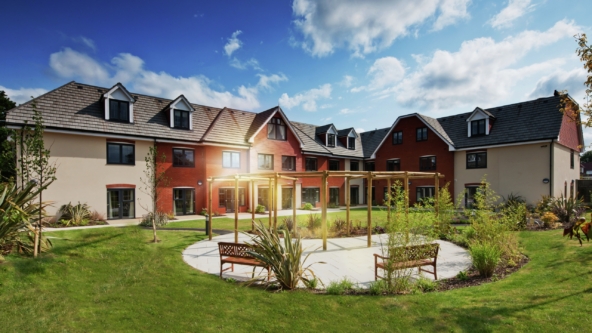This article is intended for professional investors only.
Did you know the UK is facing a shortage of affordable homes for those needing them the most?
Right now, the social housing sector requires sustainable funding routes to build more energy-efficient and genuinely affordable homes. As Octopus launches its affordable housing strategy for institutional investors, we will look at how private capital can be channelled to the sector as trusted partners for the long term.
When you think of home, what comes to mind?
Maybe it’s that little nook or a spot on the sofa you settle into after a long day.
Or your inviting bedroom filled with all your favourite things.
Perhaps it’s the kitchen, the heart of any home, where you’ve shared countless meals with friends and family.
For most of us, home is a sanctuary – a place that’s safe, warm, and secure.
However, not everyone is as fortunate.
Across the UK, thousands of families live in inadequate housing with no end in sight. They’re stuck in old housing stock, which is energy inefficient and compounding already sky-high energy bills.
And for those that are homeless, the situation is even more dire, with many forced to wait in bed and breakfast accommodation for months on end.
But the problem goes far beyond that. For millions, getting on the property ladder feels like an unattainable dream, as median incomes and smaller deposits make it harder and harder to secure a place to call their own.
The UK simply isn’t building enough affordable homes. One in seven households are living in homes that are either too expensive, insecure, or unsuitable 1.
And the numbers are staggering: over 1.1 million households are on waiting lists, and 8.5 million people face unmet housing needs 2.
What’s more, Britain has a backlog of 4.3 million unbuilt homes that are missing from the housing market. If the government’s current target of building 300,000 homes a year was met, it would still take at least half a century to fill the housing deficit 3.
It’s also no longer just about providing more homes.
As the sector shifts towards net zero, it’s essential to prioritise energy-efficient housing that can help to combat fuel poverty. And by building such homes, we can help families save money on energy bills while working towards a more sustainable future.
Private capital has a critical role to play in making this a reality.
Institutional investors are part of the solution
Addressing the affordable housing crisis requires a multi-pronged approach.
Even though the government has taken steps forward, it needs help to achieve its housing provision and net zero goals. This is where private capital can play a significant role in speeding up the development of high-quality, energy-efficient housing.
Private investment in affordable housing also benefits a wide range of stakeholders.
For people and families who need homes, it can speed up the construction of better-quality housing, benefiting both buyers and renters. And with more affordable housing available, people on median incomes with lower deposits, including key workers, can get onto the property ladder.
Housing associations and local authorities, seeking alternative funding sources for their development pipelines amidst net zero costs and increased debt costs, need trusted partners and private capital to step up. So, channelling institutional capital into affordable housing can enable them to meet their provision and net zero goals while providing institutional investors with the potential to achieve their financial and impact objectives.
However, for private capital to have a real impact, it needs to align with stakeholder interests, have a strong regulatory framework, and offer long-term patient capital to the sector. Better governance and risk management practices are essential.
By adopting an approach that considers all these factors, we can work towards a future where everyone can access safe, energy-efficient, affordable housing.
And, while long lease models can be effective in many sectors, we think there’s an opportunity to structure private investment more sustainably in the affordable housing space.
How Octopus is addressing the challenge
We recently launched an affordable housing strategy to address the pressing need for affordable homes – and we believe it can make a real difference.
Our strategy is to align closely with the social housing sector. We want to marry the development expertise of Housing Associations and Local Authorities with our sustainability-focused goals and investors’ private capital to form a more collaborative and long-term model.
One of the key parts of our strategy was to acquire a Registered Provider (RP) of Social Housing which happened back in May 2022. This has allowed us to have a scalable ‘direct let’ model, which means that the risk is shared fairly with approved Housing Association partners who manage the properties on our behalf.
As an RP ourselves, we can ensure our strategy is appropriately regulated and provides transparency to all our stakeholders, giving them peace of mind.
And our goals don’t stop there.
We want to create a sustainable funding route for the affordable housing sector that will last for decades to come.
That’s why we’re committed to being a ‘forever landlord’, building a portfolio of properties that our investors and we can be truly proud of. We aim to fund the building of more energy-efficient homes that are affordable from the outset and throughout their use.
We want to work towards a future where more people have access to a secure and stable home – a sanctuary they can call their own.
“Our customers, partners, and investors want sustainability. And we plan to provide that by investing in affordable homes that’ll remain of good quality long-term and have a huge social impact through their occupation.”
Jack Burnham, Head of Affordable Housing at Octopus.
1 1 in 7 people in England directly hit by the housing crisis, National Housing Federation, 2019
2 People in housing need 2021, National Housing Federation, 2021
3 The housebuilding crisis: The UK’s 4 million missing homes, Centre for Cities, 2023



